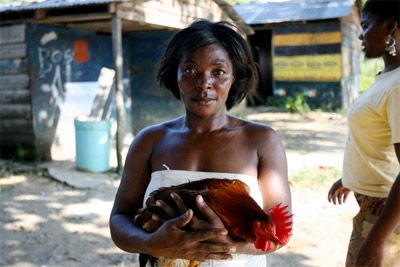Anticipatory Set:
Write the word Caribbean on the board.
- Have the students write down five words that come into their head when they hear “Caribbean”
- Write the responses on the board
- Remind the students that the Dominican Republic is part of the Caribbean. Have the students write down five words describing the Dominican Republic based on the article.
- Write responses on the board 5. Discuss what the students notice about the responses
Distribute the blank maps of the Caribbean (map here).
- Ask the students to label the Dominican Republic.
- Discuss what the students notice (e.g. proximity to the U.S., size, general location).
Project the information on HIV/AIDS on the screen and read to the students.
Info to project: "The Caribbean region is second only to Sub-Saharan Africa in HIV prevalence with an estimated adult HIV prevalence rate of 2.3% in 2003. Approximately 430,000 adults and 23,000 children are living with HIV in the region. HIV/AIDS is the leading cause of death among adults in the 15-44 age group. The epidemic is not just a health problem, but a development and economic problem as it affects the most productive human resources and re-directs efforts from productive activities to HIV/AIDS treatment and care. If the prevalence of HIV in the Caribbean region continues to increase and maintains its negative effects on production and savings, per capita growth will significantly decline."
- What additional information is included in the paragraph?
- The source for the information is the World Bank. Do you consider the World Bank a non-biased source? Explain.
Procedures:
Note: For additional support in implementing the curriculum, use the Socratic Seminar guide.
Divide the class in half.
- Put the chairs into two circles (one circle surrounding the other circle)
- Have half of the students sit in the inner circle and the other students sit in the seats surrounding the circle
- Refer to the handout “Guidelines for Participants in a Socratic Dialogue” and review
- Explain the “hot seat” to the students – if you are seated in the outer circle and would like to share a comment you can take the “hot seat”
Questions for Discussion Group 1:
- What is the issue?
- What other problems do the people face?
- Define the role of the United States government in the crisis? United States citizens?
- Describe efforts to curb the crisis. Are they enough? Explain your thinking.
- To what extent does the government of the United States have a responsibility to aid the people of the area? Explain your response.
Video Clip: Show the video clip on sex workers to the class (resource #2)
Change seating arrangement (Group 2 should be in the inner circle)
Questions for Discussion Group 2:
- Is the Dominican Republic hindered or helped by the stereotype that it is a vacationer’s island paradise? Explain your thinking.
- To what extent is AIDS a health problem? To what extent is AIDS an economics problem?
- To what extent does the government of the United States have a responsibility to aid the people of the area? Explain your response.
- What impact did the video clip have on your opinion?
- Write an “exit slip” with the answer to the following question (five to seven sentences): Why should we care about the AIDS crisis in the Dominican Republic?
Additional Resources:
Student Preparation:
1. Assign the Antigone Barton article on Boca Chica, Dominican Republic (resource #1) as homework prior to the class focusing on the article.
2. Have the students respond to the discussion questions attached and write a 3 – 5 sentence summary of the most important points they learned by reading the article.
3. Teacher Note: The students will be using the article in the Socratic Seminar. The students should write their responses on the printed article and use a highlighter to indicate supporting evidence for their ideas.
Lesson Created by Liz Morrison. Liz Morrison is the coordinator of social studies for the Parkway School District located in west St. Louis County. In 2001, Liz was selected as the National Council for the Social Studies Secondary Teacher of the Year. Liz was the featured guest on Talk of the Nation in September 2002 regarding teaching 9/11 and other “hot topics” in public high schools. In addition, Liz Morrison’s work with controversial issues in the classroom was featured in the Annenberg program “Social Studies in Action.”













